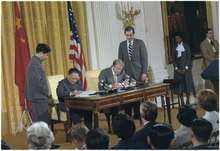Three Communiqués
The Three Communiqués or Three Joint Communiqués (Chinese: 三个联合公报) are a collection of three joint statements made by the governments of the United States and the People's Republic of China (P.R.C.). The communiqués played a crucial role in the establishment of relations between the U.S. and the P.R.C. and continue to be an essential element in dialogue between the two states.
1st
| Wikisource has original text related to this article: |
The first communiqué (February 28, 1972), known as the Shanghai Communiqué, summarizes the landmark dialogue begun by President Richard Nixon and Premier Zhou Enlai during February 1972. Some of the issues addressed in this communiqué include the two sides' views on Vietnam, the Korean Peninsula, India and Pakistan and the Kashmir region, and perhaps most importantly, the Taiwan (Republic of China) issue (i.e., Taiwan's political status). Essentially, both sides agreed to respect each other's national sovereignty and territorial integrity. The United States formally acknowledged that "all Chinese on either side of the Taiwan Strait maintain there is but one China".
2nd

| Wikisource has original text related to this article: |
The second communiqué (January 1, 1979), the Joint Communiqué on the Establishment of Diplomatic Relations, formally announces the commencement of normal relations between the United States and the People's Republic of China. In so doing, the United States recognized that the government of the People's Republic of China was the sole legal government of China. In addition, the United States government declared that it would end formal political relations with the Republic of China ("Taiwan") while preserving economic and cultural ties. Both sides reaffirmed their wish to reduce the risk of international conflict as well as avoidance of hegemony of any nation in the Asia-Pacific region.
3rd
| Wikisource has original text related to this article: |
The third and final communiqué (August 17, 1982), also known as August 17th communiqué, reaffirms the desire of both sides to further strengthen economic, cultural, educational, scientific, and technological ties. Both sides also reaffirmed the statements made about the Taiwan issue in the previous communiqué. Although no definitive conclusions were reached on the issue of arms sale to Taiwan, the United States did declare its intent to gradually decrease its sale of arms to Taiwan.
Afterwards, the US unilaterally complemented the third communique by adopting the so-called "Six Assurances" to Taiwan.
See also
- China-United States relations
- United States-Taiwan relations